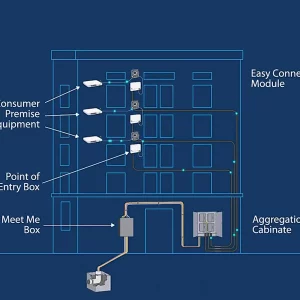Sponsored Links
UPDATE2 UK ISPs Give Mixed Reaction to New Broadband Advertising Rules
Posted: 29th Sep, 2011 By: MarkJ
 Internet providers have expressed mixed feelings today after the UK Advertising Standards Authority (ASA) and Committee of Advertising Practice (CAP) announced new guidelines this morning (here), which are designed to curtail the culture of making misleading "up to" broadband speed and "unlimited" use claims in adverts.
Internet providers have expressed mixed feelings today after the UK Advertising Standards Authority (ASA) and Committee of Advertising Practice (CAP) announced new guidelines this morning (here), which are designed to curtail the culture of making misleading "up to" broadband speed and "unlimited" use claims in adverts.As usual ISPreview.co.uk has moved to collect the thoughts of broadband providers from across the industry. The majority of ISPs claim to be broadly in favour of advertising being clearer and more honest, although many fear that the new methodology for achieving this could be flawed.
At the same time not a single ISP has, so far, had anything bad to say about the new "unlimited" guidance. Those changes appear to have almost total support but then they weren't terribly strict and thus didn't tread on too many toes.
The Director of AAISP UK, Adrian Kennard, told ISPreview.co.uk:
"We are always in favour of advertising being clear an honest. However, this is missing the point to some extent. Apart from the fact that "up to" is perfectly clear, the issues most end users have with speed is not down to the line sync anyway but the ISP back haul and contention. At A&A we aim not to be the bottleneck, but there are still many ways an individual file transfer can be slower than the sync speed as we don't control the whole Internet!
Long ago we removed the term "up to" and used "not more than" just to be clearer, but in light of the new comments we no longer state a speed for DSL lines. Instead we refer people to the line checker which has always been available and gives a pretty accurate indication of speeds and services available to customers individually.
We welcome the removal of "unlimited" where the service is in fact limited. Of course, we are "unlimited" in that we don't impost limits or have fair usage policies - we simply charge for what you use, just like gas or electricity. We don't use that term though so not a problem."
"We are always in favour of advertising being clear an honest. However, this is missing the point to some extent. Apart from the fact that "up to" is perfectly clear, the issues most end users have with speed is not down to the line sync anyway but the ISP back haul and contention. At A&A we aim not to be the bottleneck, but there are still many ways an individual file transfer can be slower than the sync speed as we don't control the whole Internet!
Long ago we removed the term "up to" and used "not more than" just to be clearer, but in light of the new comments we no longer state a speed for DSL lines. Instead we refer people to the line checker which has always been available and gives a pretty accurate indication of speeds and services available to customers individually.
We welcome the removal of "unlimited" where the service is in fact limited. Of course, we are "unlimited" in that we don't impost limits or have fair usage policies - we simply charge for what you use, just like gas or electricity. We don't use that term though so not a problem."
The MD of Fluidata UK, Piers Daniell, said:
"The ASA has been slow in bringing these new rules to fruition and I feel they don't go far enough to remove the confusion consumers receive when signing up for broadband services. The problem is that every customer experience is unique, and tying that back to a national advertising campaign is difficult.
I would have liked to see more clarification and openness with regards to traffic shaping and restrictions employed within our industry which can affect the internet experience as much as a poor sync rate."
"The ASA has been slow in bringing these new rules to fruition and I feel they don't go far enough to remove the confusion consumers receive when signing up for broadband services. The problem is that every customer experience is unique, and tying that back to a national advertising campaign is difficult.
I would have liked to see more clarification and openness with regards to traffic shaping and restrictions employed within our industry which can affect the internet experience as much as a poor sync rate."
Jon James, Executive Director of Broadband at Virgin Media UK, said:
"This is a much needed and long awaited victory for consumers. The new rules are a big step in the right direction and the greater transparency will ensure people can make more informed choices. ISPs will no longer be able to hide behind generic terms or catch-all claims which they simply cannot deliver.
However there needs to be vigilant scrutiny to ensure this is genuinely applied to all marketing and that the spirit behind this demand for change is upheld, not just the minimum necessary is done to be acceptable."
"This is a much needed and long awaited victory for consumers. The new rules are a big step in the right direction and the greater transparency will ensure people can make more informed choices. ISPs will no longer be able to hide behind generic terms or catch-all claims which they simply cannot deliver.
However there needs to be vigilant scrutiny to ensure this is genuinely applied to all marketing and that the spirit behind this demand for change is upheld, not just the minimum necessary is done to be acceptable."
A TalkTalk Spokesperson added:
"We are committed to clarity and have led the way on accurately representing broadband speeds. TalkTalk was the first provider to ensure that every customer gets an estimated speed for their line when they sign up. Our advertising does not focus on ‘up to’ speeds and we encourage potential customers to use our speed checker where we provide an estimate of the fastest speed their line can handle."
"We are committed to clarity and have led the way on accurately representing broadband speeds. TalkTalk was the first provider to ensure that every customer gets an estimated speed for their line when they sign up. Our advertising does not focus on ‘up to’ speeds and we encourage potential customers to use our speed checker where we provide an estimate of the fastest speed their line can handle."
Darren Farnden, Entanet Head of Marketing, said:
"Whilst we commend the ASA for attempting to protect consumers from potentially misleading broadband advertising, we have a number of concerns over the new guidelines and feel that they are actually more likely to cause further confusion.
Firstly, we feel that providing this level of detail to non-technical end users will compound the confusion. Currently the end user is normally given a maximum speed based on the capabilities of the technology and any associated disclaimers (e.g. subject to line quality and length). However, with the new guidelines the end user could end up with multiple speed statements based on either national or regional campaigns, peak and off peak times and more complicated justifications and disclaimers to explain how the speeds were calculated.
Additionally, the speeds quoted will still only be experienced by 10% of the ISPs customer base, providing the end user with little indication (or confidence) of the actual speed they are likely to achieve. For several years ISPs have been required to provide availability checkers to indicate achievable speed at the point of order and consumers have still been left confused - providing them with even more complex speed information is likely to worsen the problem rather than solve it.
We also have concerns over the potential for abuse in these proposals. It's feasible that an ISP could reject orders from more rural locations that would see their headline speeds significantly reduced, adversely affecting the digital divide. Similarly, ISPs that specifically target more rural locations could appear to be performing poorly when compared to national ISPs or those targeting areas with higher average speeds, making it more difficult for them to compete when they are actually selling the same technologies. There are many areas for concern within the new guidelines."
"Whilst we commend the ASA for attempting to protect consumers from potentially misleading broadband advertising, we have a number of concerns over the new guidelines and feel that they are actually more likely to cause further confusion.
Firstly, we feel that providing this level of detail to non-technical end users will compound the confusion. Currently the end user is normally given a maximum speed based on the capabilities of the technology and any associated disclaimers (e.g. subject to line quality and length). However, with the new guidelines the end user could end up with multiple speed statements based on either national or regional campaigns, peak and off peak times and more complicated justifications and disclaimers to explain how the speeds were calculated.
Additionally, the speeds quoted will still only be experienced by 10% of the ISPs customer base, providing the end user with little indication (or confidence) of the actual speed they are likely to achieve. For several years ISPs have been required to provide availability checkers to indicate achievable speed at the point of order and consumers have still been left confused - providing them with even more complex speed information is likely to worsen the problem rather than solve it.
We also have concerns over the potential for abuse in these proposals. It's feasible that an ISP could reject orders from more rural locations that would see their headline speeds significantly reduced, adversely affecting the digital divide. Similarly, ISPs that specifically target more rural locations could appear to be performing poorly when compared to national ISPs or those targeting areas with higher average speeds, making it more difficult for them to compete when they are actually selling the same technologies. There are many areas for concern within the new guidelines."
A Zen Internet Spokesperson added:
"Zen Internet welcomes the latest changes to the Advertising Standards Authority’s (ASA) policy and will update, where necessary, information provided to customers regarding our broadband services. We have always been clear and transparent with regards the speeds of our services and confirm to our customers the actual expected speed of their service during the order process.
Broadband is a complex technology with many factors determining the overall performance of an individual service. We, therefore, feel that there must be more emphasis on educating and informing customers in this respect and much less focus on headline speeds. The “big six” ISPs dominate advertising and media coverage of broadband and therefore have a responsibility to play a bigger part in the education of consumers."
"Zen Internet welcomes the latest changes to the Advertising Standards Authority’s (ASA) policy and will update, where necessary, information provided to customers regarding our broadband services. We have always been clear and transparent with regards the speeds of our services and confirm to our customers the actual expected speed of their service during the order process.
Broadband is a complex technology with many factors determining the overall performance of an individual service. We, therefore, feel that there must be more emphasis on educating and informing customers in this respect and much less focus on headline speeds. The “big six” ISPs dominate advertising and media coverage of broadband and therefore have a responsibility to play a bigger part in the education of consumers."
Mark Nichols, Head of Marketing at Be Broadband , said:
"This is welcome news to broadband users nationwide as a shot in the arm for honesty and clarity from our industry, and something we welcome at BE. Confusion amongst consumers over speed and 'unlimited use' has long been to the detriment to our industry and it's great to see the ASA taking this positive step for us all."
"This is welcome news to broadband users nationwide as a shot in the arm for honesty and clarity from our industry, and something we welcome at BE. Confusion amongst consumers over speed and 'unlimited use' has long been to the detriment to our industry and it's great to see the ASA taking this positive step for us all."
The ISPA Secretary General, Nicholas Lansman, added:
"ISPA notes the ASA's new guidelines on the advertising of broadband speeds. Broadband speed is only one of a number of factors customers consider when choosing an ISP. Providing customers with transparent and fair detail about broadband speeds is important, such as a likely speed quote at the point of sale.
A number of factors outside of an ISP's control - such as the distance a customer lives from the telephone exchange or the condition of a customer's phone line leading to and inside the property - affect the speed achieved and we are concerned that the new guidance does not take this into account.
Furthermore, the ASA guidance and previous Ofcom broadband speed reports do not fully take into account the breadth of the ISP industry, which encompasses a wide range of providers offering competitive services, and future reports should go further to reflect this.
ISPA is also concerned about the clarity of the new guidance for consumers. ISPA recommends all consumers wishing to choose a provider should choose an ISPA member so that they are covered by the ISPA Code of Practice and complaints procedure."
"ISPA notes the ASA's new guidelines on the advertising of broadband speeds. Broadband speed is only one of a number of factors customers consider when choosing an ISP. Providing customers with transparent and fair detail about broadband speeds is important, such as a likely speed quote at the point of sale.
A number of factors outside of an ISP's control - such as the distance a customer lives from the telephone exchange or the condition of a customer's phone line leading to and inside the property - affect the speed achieved and we are concerned that the new guidance does not take this into account.
Furthermore, the ASA guidance and previous Ofcom broadband speed reports do not fully take into account the breadth of the ISP industry, which encompasses a wide range of providers offering competitive services, and future reports should go further to reflect this.
ISPA is also concerned about the clarity of the new guidance for consumers. ISPA recommends all consumers wishing to choose a provider should choose an ISPA member so that they are covered by the ISPA Code of Practice and complaints procedure."
Simon Davies, IDNet UK's Director, told ISPreview.co.uk:
"With regard to the "typical speed" requirement: that is akin to forcing Ferrari to advertise their products to Londoners as "typically 5mph". It is not the ISPs fault that a customer might have a poor quality or long line - given adequate conditions the product is perfectly capable of achieving the advertised speed. It is much more useful to the consumer to give them a speed estimate for their own line.
Our experience indicates that consumers expect the term "unlimited" to refer to the performance of their service i.e. without any traffic management at all. The word "unlimited" is unambiguous, this 'rule' still allows rogue ISPs to abrogate the definition - even qualified with "truly", which is perfectly perverse!"
"With regard to the "typical speed" requirement: that is akin to forcing Ferrari to advertise their products to Londoners as "typically 5mph". It is not the ISPs fault that a customer might have a poor quality or long line - given adequate conditions the product is perfectly capable of achieving the advertised speed. It is much more useful to the consumer to give them a speed estimate for their own line.
Our experience indicates that consumers expect the term "unlimited" to refer to the performance of their service i.e. without any traffic management at all. The word "unlimited" is unambiguous, this 'rule' still allows rogue ISPs to abrogate the definition - even qualified with "truly", which is perfectly perverse!"
A number of the complaints do have merit, such as concerns over the growing complexity of information. But it goes without saying that most of the fears have come from providers that offer ADSL (up to 8Mbps) and ADSL2+ (up to 20-24Mbps) based services, which account for the majority of the market and will also be among the worst affected by today's change.
By contrast Virgin Media, which is well known for running a strong Cable broadband network and offering more reliable speeds, has of course praised the guidelines because they would clearly stand to benefit. We suspect that many dedicated fibre optic ( FTTH ) providers will feel the same way.
Several ISPs, such as TalkTalk, have also elected to avoid the problem by not posting their speeds and we wouldn't be surprised to see others follow; at least until superfast services become more prevalent. But not displaying your speed is a risky strategy and could make some providers look less competitive or even face criticism for hiding their performance.
Overall consumers should benefit, provided all of the extra information is clearly displayed and explained. In an ideal world the rules would also make it easier to spot an underperforming provider, although some of the worst affected ISPs will no doubt find a way to avoid that.
Separately one of the biggest consumer concerns right now is with enforcement. The ASA simply doesn't have any teeth and its slow reaction times do little to prevent bad promotions from misleading consumers (they're usually over by the time anything happens). Keep your eyes peeled as we have more ISP reactions to add over the next few hours/days.
UPDATE 3:09pm
Added new comments from the ISPA and Be Broadband above.
UPDATE 30th September 2011
Added a comment from IDNet .
Search ISP News
Search ISP Listings
Search ISP Reviews
Latest UK ISP News







Cheap BIG ISPs for 100Mbps+
150,000+ Customers | View More ISPs
Cheapest ISPs for 100Mbps+
Modest Availability | View More ISPs
Latest UK ISP News
Helpful ISP Guides and Tips
Sponsored Links
The Top 15 Category Tags
- FTTP (6837)
- BT (3897)
- Politics (3087)
- Business (2782)
- Openreach (2674)
- Building Digital UK (2520)
- Mobile Broadband (2491)
- FTTC (2145)
- Statistics (2141)
- 4G (2107)
- Virgin Media (2038)
- Ofcom Regulation (1785)
- 5G (1749)
- Fibre Optic (1607)
- Wireless Internet (1601)
Sponsored
Copyright © 1999 to Present - ISPreview.co.uk - All Rights Reserved - Terms , Privacy and Cookie Policy , Links , Website Rules






























